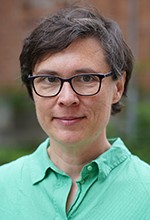Prof. Dr. Suntje Schmidt
Projects
Ongoing Lead Projects
Ongoing Third-party Funded Projects
Completed Lead Projects
Completed Third-party Funded Projects
Completed Cross-departmental Projects
Selected Publications by Year
Selected Publications by Type
Talks
Memberships
-
Berlin University of Technology (External organisation)
-
WIR! – Wandel durch Innovation in der Region (External organisation)
-
Humboldt-Universität zu Berlin, Geographisches Institut (External organisation)
-
Kompetenzzentrum Kultur- und Kreativwirtschaft des Bundes (External organisation)
-
Raumwerk D (Stadt Düsseldorf) (External organisation)
-
Humboldt-Universität zu Berlin. Mathematisch-Naturwissenschaftliche Fakultät (External organisation)
-
Humboldt University of Berlin (External organisation)
-
Humboldt-Universität zu Berlin, Geographisches Institut (External organisation)
-
Humboldt-Universität zu Berlin, Geographisches Institut (External organisation)
-
Research Group Collaborative Spaces (External organisation)
-
Gottfried Wilhelm Leibniz Universität Hannover. Institute of Economic and Cultural Geography (External organisation)
-
Joint Spatial Planning Department Berlin-Brandenburg (External organisation)
-
Staatskanzlei des Landes Brandenburg (External organisation)
-
Gottfried Wilhelm Leibniz Universität Hannover. Institute of Economic and Cultural Geography (External organisation)
-
Niederrhein University of Applied Sciences (External organisation)
-
Humboldt-Universität zu Berlin, Geographisches Institut (External organisation)
-
Humboldt-Universität zu Berlin, Geographisches Institut (External organisation)
-
Karl-Franzens-University of Graz. Institute of Geography and Regional Science (External organisation)
-
Humboldt-Universität zu Berlin, Geographisches Institut (External organisation)
-
Humboldt-Universität zu Berlin. Mathematisch-Naturwissenschaftliche Fakultät (External organisation)
-
Geographical Society of Berlin (External organisation)
-
BMFTR - Bundesministerium für Forschung, Technologie und Raumfahrt (External organisation)


